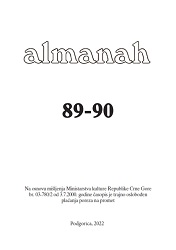Sandžački Bošnjaci u Istanbulu između asimilacije i etničke revitalizacije: Uvod u selektivne historijske, sociološke, političke i sociolingvističke aspekte
The Bosniacs of Sandžak Origin in Istanbul between Assimilation and Ethnic Revival: Introduction to Selected Historical, Sociological, Political and Sociolinguistic Aspects
Author(s): Christoph GieselSubject(s): Social history, Sociolinguistics, Cultural Anthropology / Ethnology, Migration Studies, Identity of Collectives
Published by: Almanah
Keywords: Bosniacs of Sandžak; Istanbul; assimilation; ethic revival; migration to Ottoman empire and Turkey; Bosniac heritage; language of the Bosniacs from Istanbul;
Summary/Abstract: Between 1878 and 1970, a large number of Bosniacs from the territories of today’s Bosnia, Serbia, Montenegro, Kosovo and (Northern-) Macedonia emigrated in several waves to the Ottoman Empire and Turkey. Estimates regarding the number of Turkish citizens of Bosniac heritage range between 3 and 9 million, but the number of Shtokavian resp. Bosnian or “Bosniac” speakers only ranges from several ten thousand to a maximum of several hundred thousand. The vast majority of Turkish Bosniacs living in Istanbul originate from the Serbian and Montenegrin Sandžak which their families left in the 1950s and 1960s due to various reasons. Despite the rigid assimilation policies pursued by the Turkish state in the 20th century, they succeeded in retaining certain forms of their “Yugoslav-Muslim” or Bosniac ethnicity within the context of their social and linguistic embeddedness in Turkey where they are subject to a mixture of Turkish assimilation and ethnic revival processes. This is why this community displays numerous and multi-faceted aspects of identity, social, linguistic and ethnic attitudes as well as collective memories. Furthermore, their South Slavic Shtokavian ethno-language which is threatened by extinction is characterised by specific influences and idiosyncrasies which in their combination are unique to Turkey’s Bosniac community. After introductory remarks (time period and reasons of migration, distribution, number, ethnonyms, language names and other special features) and reflections about selective historical, ethnical, political and sociological aspects this paper furthermore investigates socio-linguistic attitudes and characteristics of the “Sandžak-Bosniacs” from Istanbul. In the context of considering these aspects, the phenomena of the dynamics of ethnic identities and assimilation also play an important role. In contrast to the mostly descriptive character of the introductory and main sections of the text, the concluding section of the paper presents assessments, theses and discussion aspects. Here, for example, a discussion on the significance and preservation of these historical, cultural, ethnic, social and linguistic forms of the Slavic population in Turkey should be promoted within the framework of the activities of Slavic Studies / Bosnian Studies and other academic subjects and NGO’s. Beside it, one of many other aims of this final section is to stimulate a discussion about the significance and meaning of the type of language and the socio-linguistic attitudes of the Bosniacs in Istanbul within the context of the language science paradigms and politics of language nationalism in several states of the former Yugoslavia. Reflections and analyses of selected vernacular and contact-linguistic characteristics of the South Slavic / Shtokavian (Turkish influenced) language of the Bosniacs from Istanbul will be published in a later issue of “Almanah”. There, the linguistic-political discussion aspects and arguments already addressed in this article will be revisited and supplemented by incorporating the results of the linguistic analyses of the forthcoming essay.
- Issue Year: 2022
- Issue No: 89-90
- Page Range: 113-136
- Page Count: 24
- Language: Bosnian
- Content File-PDF

